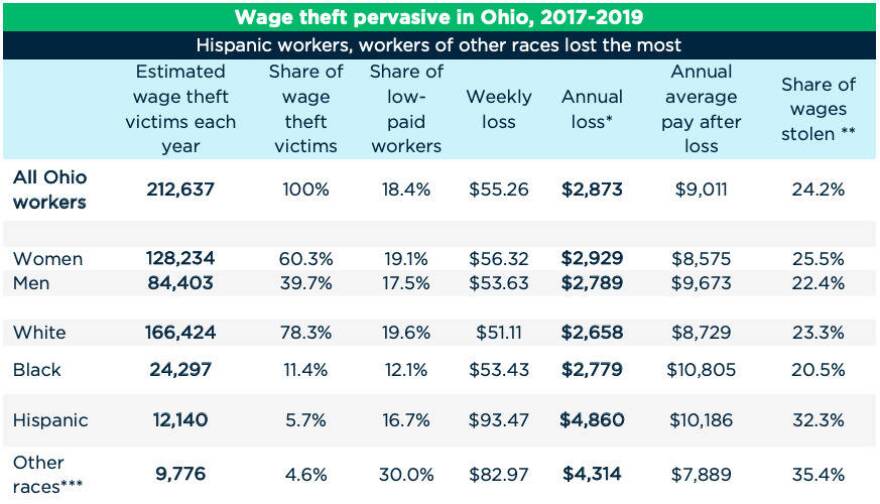Nearly a quarter million Ohioans are paid less than the state or federal minimum wage, according to data analysis by Policy Matters Ohio.
The prevalence of these minimum wage violations has led cities across Ohio to take action. Cincinnati, Columbus and Cleveland all passed ordinances to enhance enforcement around wage theft in the last seven years. This year, Dayton and Cuyahoga County followed suit.
The measures make it harder for businesses who violate the federal Fair Labor Standards Act to secure a contract with their local governments.
“Municipal governments have started to step forward to try to do their part to also make sure that employers are being held accountable,” said Michael Shields, an economic researcher at Policy Matters Ohio.
“This is a very large scale problem. Oftentimes, working people are not able to get a remedy.”Michael Shields, researcher with Policy Matters Ohio
Many of the ordinances outright ban cities from working with businesses who have a history of committing wage theft. Shields said the idea is to make it costly for employers who aren’t diligent in paying workers for all their hours.
“You could really lose out on a lucrative and valuable contract if you engage in these kinds of practices,” he said.
What is wage theft?
Wage theft is any time that an employer doesn’t pay a worker for all the hours they are owed, Shields said. That can take many forms – from paying a below minimum wage salary to not paying overtime hours.
Although anyone can be a victim of wage theft, Shields said some Ohioans are more vulnerable to workers’ rights violations. Native Spanish speakers are 74% more likely to experience wage theft than those whose primary language is English, for instance, according to Shields's 2022 report.
Women are also more likely to be victims of wage theft, he said.
“It's workers who have relatively fewer options. It's workers who have limited ability to assert their rights at work,” Shields said.
Enforcement challenges
Shields said many Ohioans don’t report minimum wage violations out of fear of retaliation from their employers. Even if they do take the step to report it, Shields said Ohio has limited few resources to helping victims of wage theft.
“This is a very large scale problem,” he said. “Oftentimes, working people are not able to get a remedy.”

If a worker is being paid below the minimum wage and keeps their job for a full year, the losses amount to nearly $3,000 in unpaid wages, Shields said.
“If you flip the roles, and you were talking about an employee who stole $2,900 from their employer, that person could be looking at a felony, a felony that potentially carries prison time,” he said.
Statewide solutions
Shields said he’s encouraged by the amount of progress municipalities across the state have made in overseeing wage theft violations. But, he said, more can still be done.
He wants to see the state devote more resources toward the issue. He said there needs to be more people who are devoted full-time to investigating wage theft.
In a statement to The Ohio Newsroom, The Ohio Department of Commerce said their team investigates every complaint they receive, and they don’t have a significant backlog at this time.
"While we are receiving more complaints now through our online system that launched last year, to this point, we have been able to manage the increase," a spokesperson said.
The ODC said wage theft is "a serious issue" and encourage Ohioans to submit their complaints.
Shields said Ohio also should require employers to give their employees pay statements, so that workers can notice violations sooner.
“Without one, it can make it really difficult for a person to even assess whether they've been a victim of wage theft,” he said.
This story was updated to include a statement from the Ohio Department of Commerce.


